Want to learn how to get started with a zero waste kitchen? I honestly thought I was doing my part to save the earth by recycling everything I could. Not until someone pointed it out to me did I realize that recycling is the 3rd R in the 3Rs. One should Reduce first, then Reuse next, Recycle last.
Then I learned about that zero waste family in California with trash that fit in one small jar! From Bea Johnson's blog and book, Zero Waste Home, I learned the 5Rs: Refuse, Reduce, Reuse, Recycle and Rot (Compost) in that order. When you think about it, it makes sense. Refuse what you don't need, reduce what you do need, reuse what you can, recycle what you can't refuse, reduce or reuse, and rot or compost the rest.
Did you know that every piece of plastic ever made still exists today?
What is a zero waste kitchen?
For me, zero waste means not sending anything to the landfill.
What ends up in your kitchen garbage bin? Usually, it would be plastic bags, packaging, takeout containers, coffee cups, plastic water bottles, plastic straws, food waste.
To have a zero waste kitchen is to avoid these items from going into the garbage bin and into the landfill - find alternatives that are package-free, compostable or at least recyclable.
Our family may not be zero waste yet, but I am trying as much as I can to consume less and reduce our plastic use.
And you know what? You can too.
Each change, no matter how small, matters.
Start by answering these questions:
- Where and how do you use plastic in the kitchen?
Look in your garbage bin and take note of what you're sending to the landfill.
- What package-free, reusable or sustainable option can you use instead?
Read on for my top tips for going zero waste in the kitchen - from buying and shopping to eating, dishwashing and handling waste.
1. Use reusable shopping bags
Those plastic shopping bags are everywhere. They might be recyclable in your city or at the store, but consider bringing your own reusable shopping bags instead. To reduce plastic bag usage, some stores or cities charge for plastic bags, some cities have even banned plastic bags altogether!
Keep a small reusable bag in your purse. Keep a bunch of reusable shopping bags in your car.
And those flimsy plastic bags used in the produce department are just as worse or even more. Avoid produce wrapped in plastic or has styrofoam. Consider buying loose produce and bringing your own reusable produce bags instead.
If I ever buy produce in those plastic nets, I try to see if I can reuse them as produce bags, or to scrub the sink or pots and pans (like a reader suggested below). You can also make your own produce bags or buy some reusable ones like these.
2. Shop in bulk and bring your own container to the market
More and more stores offer bulk bin shopping. There are bulk stores like Bulk Barn in Canada and many supermarkets actually have a bulk section. There are zero waste markets popping up all over the world too!
I tend to buy nuts, seeds, beans, legumes, flours and spices from the bulk section at my local health foods store. Not only are these cheaper, but I only buy what I need, so less food waste too!
In some stores, you can bring your own container. You just get the tare weight of your container (when it is empty) at the cashier before going to the bulk section. Fill it up with your product, then go back to the cashier where they will subtract the tare weight from your purchase.
You can also bring your own reusable bulk bags for buying nuts, beans or flours. These are lightweight like the reusable produce bags.
I bring my own mason jars when buying spices, beans, flours and store them as is in my pantry or fridge. (Do note that some people with severe allergies or sensitivities may not want to shop in the bulk section to avoid cross-contamination.)
Bring your own container to the meat, butcher or deli section too. I bring a large glass container to the meat section and ask that my roast or ground meat be put in it.
When available, the farmer's market is a great place to shop without packaging. Again, don't forget those reusable bags. Not only is there less packaging, but the produce is local and in season. And you'll get to talk to the farmer about what they use to grow their food, do they spray? Shopping local and seasonal is a great sustainable option.
3. Ditch the plastic water bottle
Plastic water bottle sales have increased with very poor recycling rates - the plastic recycling rate in the US is only 23%. Consider getting a good water filter and bringing your own reusable water bottle instead.
There are plenty of water filter options out there. We use the Berkey water filter system at home which filters out chlorine and other undesirables, and even fluoride with a proper filter. Check out the Berkey here.
If you don't have a water filter yet, you can start with at least filtering out chlorine from your tap water, either by letting the water sit for 24 hours to let the chlorine evaporate, or getting one of those water filter pitchers.
Fill up your reusable water bottle with clean water. There are plenty of reusable water bottle choices - stainless steel or glass are good options.
There will more plastic than fish in the ocean by 2050. -Ellen MacArthur
4. Stop sucking and ditch plastic straws
This one is not just for the kitchen - say no to plastic straws at home or elsewhere. Single-use plastic straws (and many other plastics) end up in our oceans, where they pollute the water, and turn into micro-plastics which the sea creatures consume. And if you eat seafood, you're most likely consuming plastic too. Eww.
Just say "no straw please" when getting your drink at the restaurant.
If you must use straws at home, consider getting stainless steel straws or glass straws instead. And don't forget that little straw brush to clean them.
5. Ditch single-use disposables - napkins, paper towels, cutlery, plates, cups, takeout containers
There are better alternatives to single-use disposables be they made of plastic or not.
- Use cloth napkins
- Get cloth rags or repurpose old shirts as rags
- Use reusable cutlery, plates, cups and glasses or consider compostable ones made of bamboo
- Get reusable K-cups
- Bring your own mug when buying coffee
- Bring your own container when getting take out
- Bring your own lunch to school or work in reusable containers
- Use compostable unbleached parchment paper instead of aluminum foil or wax paper
- Use beeswax food wraps instead of plastic wrap
It took us a while to switch to cloth napkins, but now I can't imagine not using them.
6. Eat real food
Processed food comes with packaging, usually plastic that is not recyclable. By eating real food and cooking food at home, we not only avoid plastic packaging, but we avoid plenty of other additives (sugar being one of them) in processed food. Eat real food and not only will your body thank you, but the planet too.
I have learned that menu planning and meal prep greatly helps in time management and makes cooking at home easier. I don't need to resort to convenience packaged food during meal times if there's something ready in the fridge.
Check out my real food recipes and my top tips for meal planning.
7. Use a natural sponge or compostable dish brush
Replacing the dishwashing sponge stumped me for a long time until I realized that a natural loofah can be used as a dishwashing sponge too! I just cut a loofah into smaller pieces for easier handling and to make them last longer. I love that it is compostable too. There are also natural dish brushes available like this one.
8. Compost
Last but not least is compost. Composting provides rich organic matter for your garden to grow your own food. A lot of garbage thrown out is actually food that can be composted.
We are lucky enough to have municipal composting with our green bin picked up curbside weekly. Depending on what your city composting system allows, you can typically compost vegetables, fruits, meat, eggshells and even hair, tissue paper, parchment paper, shredded paper. Check what can go into your green bin. It's really easy once you get used to separating your compostables, and it cuts down on your garbage a lot.
If you don't have municipal composting, consider composting on your own or look into composting services in your area. Start a backyard compost bin or try vermicomposting. Do note that you may not want to compost meat with these options at home.
These are my top tips for a zero waste kitchen. We can all do our part - every little bit counts to save our planet. And there is no time like the present to start.
Comment below and let me know - Which one are you doing right now? What will you start doing? Do you have any other tips to add?

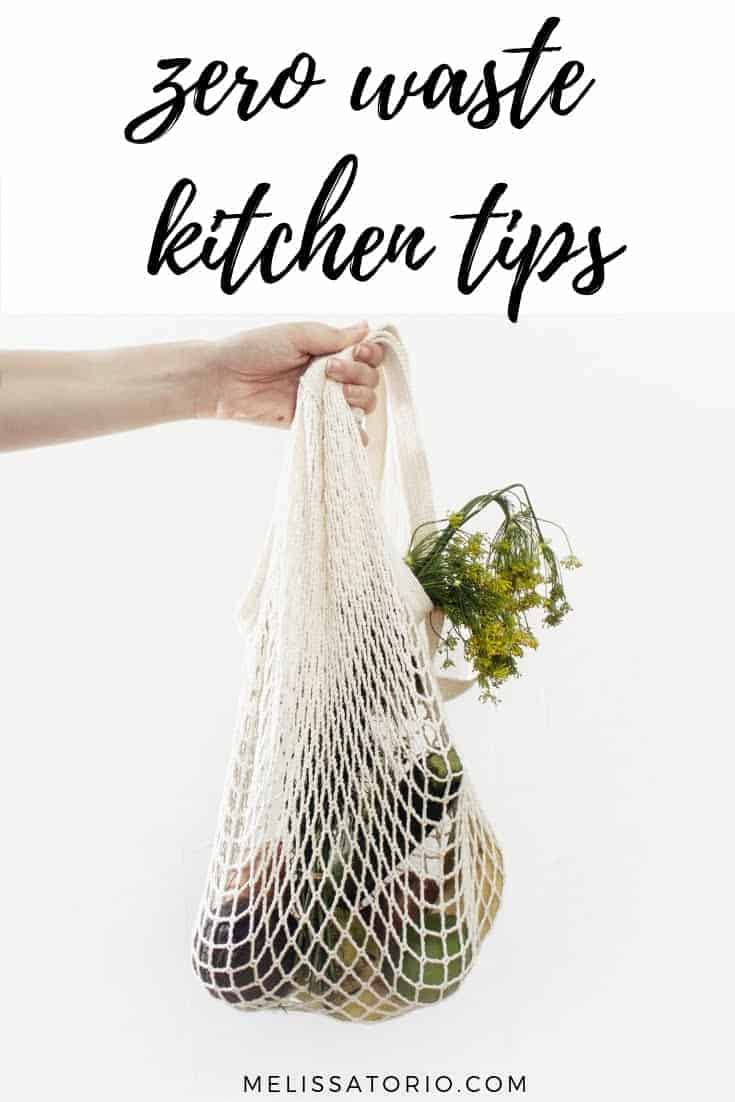
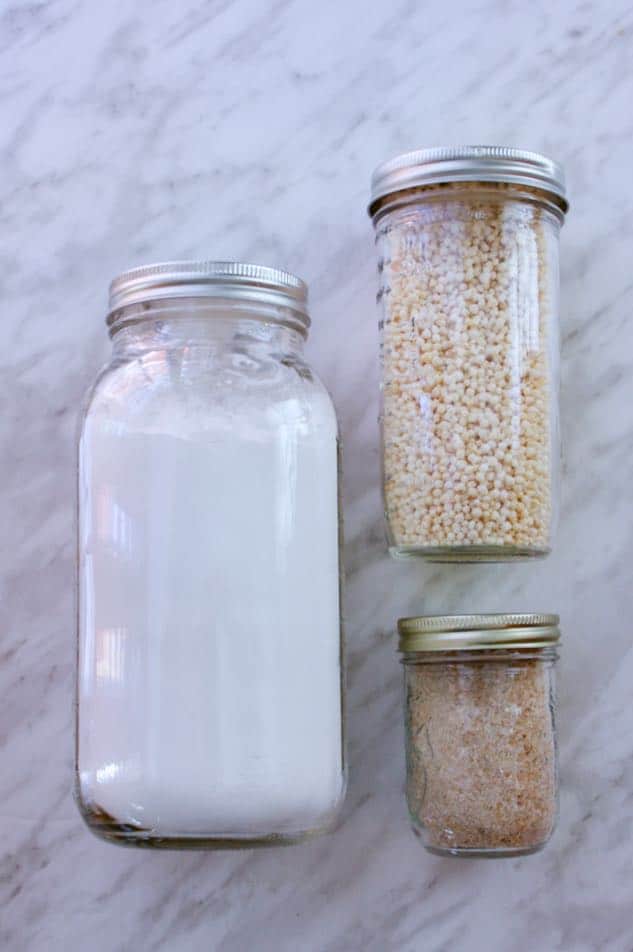
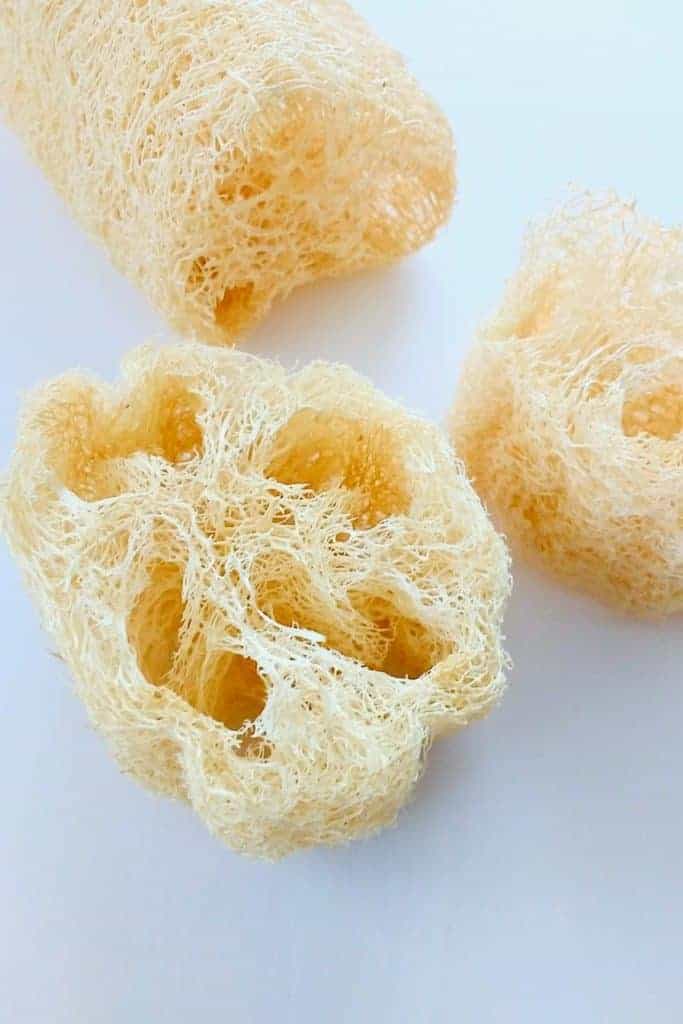
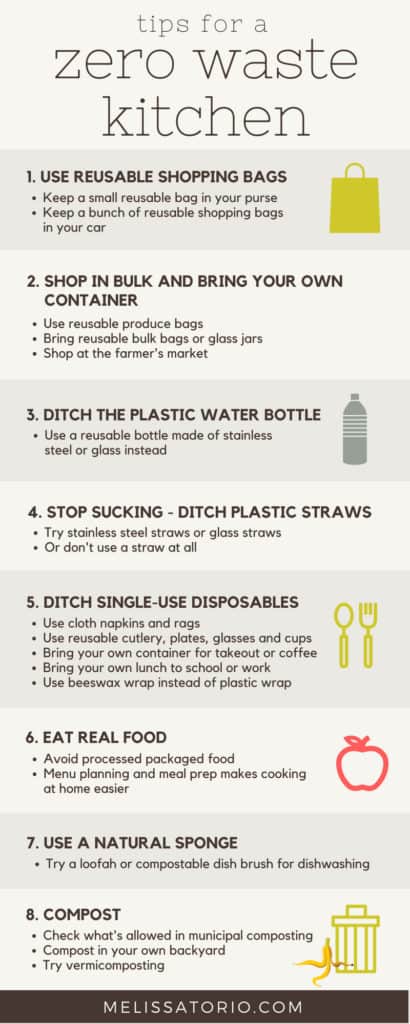
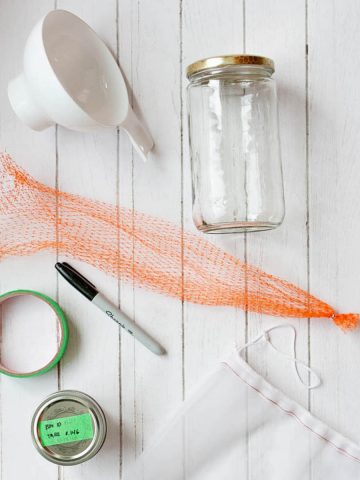
Elise Ho
It would be great to be zero waste .I will certainly consider these tips
Diane
Melissa,
These are some great tips! I wish all areas had good recycling centers. The town where I live took our recycling dumpster away, because people were just throwing their regular trash in it. My husband and I still recycle, but I have to take it to work with me instead. The step we need to improve on the most is just using less plastic to begin with.
Melissa
That's too bad that recycling is made more difficult. Yes, each baby step to use less plastic counts!
Larissa
Great tips! I love these and your graphic is so pretty too! I love the loofah idea for kitchen sponge the best! I would never have thought of that!
Melissa
Thanks, Larissa!
Alison
There are some great ideas here and ones I haven't heard of or thought about. I do meal plan and cook all of our dinners at home. And thankfully we have a good recycling program with our garbage pick up in our area, so I recycle whatever I can. I need to start bringing my reusable bags to the grocery store again though.
Melissa
Thanks, Alison. Every little bit counts!
Jennifer
Great site and love this info! I am all about sustainability!
Melissa
Thanks, Jennifer! That's awesome - we just have one planet, right?
Karen
Those mesh bags that some produce comes in make great scrubbies for pots and pans.
Melissa
Yes, what a great idea!
Natalie
These are some fantastic ideas! I have wanted to compost for years and just not been able to get started. I guess I need to get the ball rolling!
Melissa Torio
Yes, baby steps! 🙂